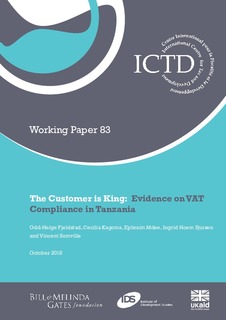The Customer is King: Evidence on VAT Compliance in Tanzania
Research report
Permanent lenke
http://hdl.handle.net/11250/2568870Utgivelsesdato
2018-10-01Metadata
Vis full innførselSamlinger
- Publications [1488]
Originalversjon
Brighton: International Centre for Tax and Development (ICTD) (ICTD Working Paper no. 83) 28 p.Sammendrag
Like governments in many other African countries, the Government of Tanzania has been striving to improve the effectiveness of its value added tax (VAT) regime by reducing tax evasion through a combination of measures, including improved tax legislation and more effective administrative processes. A key initiative was the introduction of Electronic Fiscal Devices (EFDs) in 2010. It was expected that the new technology would be beneficial to both the Tanzania Revenue Authority (TRA) and business people by improving VAT compliance and reducing administrative and compliance costs. However, VAT collection has not improved as expected. In this paper, we examine EFD compliance among businesses that have an EFD and identify factors that influence compliance. An innovation in this study is that the research design allowed us to directly observe EFD usage, an important aspect of VAT compliance. Our enumerators waited for customers departing from business premises, and then checked their receipts, interviewed them and interviewed the businesses. This design enabled us to observe each business’s actual compliance in issuing EFD receipts, thus circumventing the problem of dishonest reporting, which is common in self-reported survey data. We find that EFD compliance is strongly associated with the customer’s perception of detection and penalty risks, and with the business operator’s perception of other businesses’ compliance behaviour.
Utgiver
International Centre for Tax and DevelopmentSerie
ICTD Working Paper 83ICTD Working Paper 83
ICTD Working Paper 83
ICTD Working Paper 83
